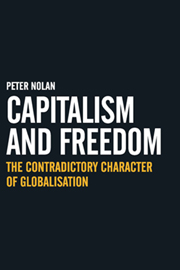Part 1 - Capitalism's Contradictory Character
Published online by Cambridge University Press: 05 March 2012
Summary
Most disputes are due to the fact that there are many scholars, and many ignorant men, so constituted that they can never see more than one side of a fact or idea; and each man claims that the aspect he has seen is the only true and valid aspect.
(Honoré de Balzac, letter to Don Michele Angelo Cajetani, Prince of Teano, dedication in Cousine Bette)What is ‘Globalisation’?
The recent explosive changes in the world business system constitute a surge forward of capitalism to a global scale. However, despite the dramatic advance of capitalism, it constitutes only the most recent stage in an evolving process that has been under way since human beings' early history. For several thousand years, human history has been organised to an ever-increasing extent around the division of labour, the extension of the scope of the market, and the pursuit of profit. This force has been the central factor in technical progress. Until the early modern period, the main consequence of technical progress was to enable population growth and output more or less to keep pace with each other, advancing together in a complex symbiotic relationship. However, around 200 years ago, a new relationship between population and per capita output emerged. Population growth and per capita output and income began an unprecedented, simultaneous acceleration.
Pre-Modern Capitalism
Capitalism, in the sense of production for profit for the market, is an ancient phenomenon.
- Type
- Chapter
- Information
- Capitalism and FreedomThe Contradictory Character of Globalisation, pp. 43 - 144Publisher: Anthem PressPrint publication year: 2007

